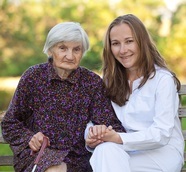Care homes and NHS need closer working relationship to improve levels of care
NHS healthcare services are failing to discuss residents' health needs with care home staff, according to a new study, which is calling for a closer working relationship to improve levels of care.
The study led by researchers at the University of Hertfordshire wants to see the NHS and care homes becoming partners in care.

Most long term care for older people is provided by independent care homes. These older people have complex needs, and are the oldest and frailest of the population. Yet their access to NHS services is inconsistent and determined by local custom and practice rather than the particular needs of the care home residents, researchers from University of Hertfordshire found.
Professor Claire Goodman, at the University of Hertfordshire’s Centre for Research in Primary and Community Care, said: “It is very clear that closer working and better integration of NHS services can promote more effective healthcare of older people living in care homes, and there are many good examples of where individual practitioners or services have tried to achieve this.
“However, our research found that there was not a particular model of working that ensured older people received consistent care, and few systems in place to evaluate what is being achieved. Over ten years ago, research highlighted that NHS provision to care homes was inequitable. Our findings suggest this is still the case and, if anything, it is worse.”
Many different NHS services visit older people in care home, however, the research which is called 'A study to develop integrated working between primary health care services and care homes' showed tensions exist between the ways the NHS services and the care homes provide care to older people. NHS services focus on diagnosis, treatment and support at specific times, whereas care homes prioritise on-going support and relationships that nurture a continuous review of the older person’s care.
The study also found that access to NHS services and identification of older peoples’ health care needs hardly ever involved joint review or discussion with care home staff, and even more rarely did it include the older person or one of their family.
The study recommends that NHS services need to see care homes as partners in care and not just the solution to the problem of where to place older people who can no longer live at home.
For care home residents, the recognition and inclusion of care home staff or a relative in the discussions on their health care needs provides the support for a more resident-focused care service.
By adjusting ways of working, the NHS services can ensure it provides healthcare which takes into account the older person’s priorities and concerns as well as the care home staff that provide the care.
The three year study was published by the National Institute for Health Research Health Services and Delivery Research (NIHR HS&DR) Programme. It was led by Claire Goodman at the University of Hertfordshire in collaboration with the University of Surrey, Lancaster University, Brunel University and University College London.
Latest News
 29-Jul-24
Dementia Bus gives carehome.co.uk staff insight into life with dementia
29-Jul-24
Dementia Bus gives carehome.co.uk staff insight into life with dementia
 01-Mar-24
Find out the top care homes in 2024
01-Mar-24
Find out the top care homes in 2024
 21-Mar-23
UK's top care homes in 2023 revealed
21-Mar-23
UK's top care homes in 2023 revealed
 03-Jan-23
carehome.co.uk launches free care helpline
03-Jan-23
carehome.co.uk launches free care helpline
 13-Dec-22
5 mins with Emily Whitehurst, chief operating officer for Constantia Healthcare
13-Dec-22
5 mins with Emily Whitehurst, chief operating officer for Constantia Healthcare